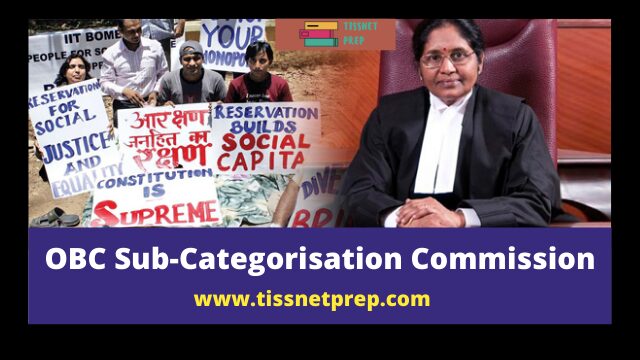Recently, the Union Cabinet has approved a six-month extension to the commission appointed to examine sub-categorisation of Other Backward Classes (OBCs), up to 31st January 2021.
Key Points
- Commission:
- Headed by Justice (Retd.) G Rohini, the commission was constituted under Article 340 of the Constitution with the approval of the President on 2nd October 2017.
- Article 340 deals with the appointment of a commission to investigate the conditions of backward classes.
- It had been constituted to complete the task of sub-categorising 5000-odd castes in the central OBC list so as to ensure more equitable distribution of opportunities in central government jobs and educational institutions.
- In 2015, the National Commission for Backward Classes (NCBC) had recommended that OBCs should be categorised into extremely backward classes, more backward classes and backward classes.
- The benefits of the reservation in OBCs are being cornered mostly by the dominant OBC groups over the years so there is a need to recognise sub-quotas for the extremely backward classes within the OBCs.
- NCBC has the authority to examine complaints and welfare measures regarding socially and educationally backward classes.
- Mandate:
- Examine the uneven distribution of reservation benefits among different castes in the central OBC list. For example, certain castes were left out of the ambit because of a difference in spelling in a State.
- Work out mechanism and parameters for sub-categorisation of OBCs, to identify castes, sub-castes and communities and classify them into sub-categories.
- Submit a comprehensive report after consultation with various stakeholders so that Census 2021 can include comprehensive data on OBCs.
- Work Done:
- It has met representatives of state governments, state backward classes commissions, community associations etc. apart from obtaining caste-wise data of OBCs in higher educational institutions and recruits in central departments, public sector banks and financial institutions.
- Expenditure:
- The expenditure related to the administration costs will be continued to be borne by the Department of Social Justice and Empowerment.
- Headed by Justice (Retd.) G Rohini, the commission was constituted under Article 340 of the Constitution with the approval of the President on 2nd October 2017.
- Reasons for Extension:
- The Commission would require more time to submit its report since the repetitions, ambiguities, inconsistencies and errors of spelling or transcription etc. appearing in the existing Central List of OBCs need to be cleared.
- Apart from that, the nationwide lockdown and restrictions on travel imposed in the wake of Covid-19 pandemic slowed down the commission’s performance.
- Possible Outcomes:
- The commission may make recommendations which will benefit the communities in the existing list of OBCs which have not been able to get any major benefit of the OBCs reservation scheme for appointment in central government posts and for admission in central government educational institutions.
Article 340 of the Indian Constitution
- The President may by order appoint a Commission consisting of such persons as he thinks fit to investigate the conditions of socially and educationally backward classes within the territory of India and the difficulties under which they labour and to make recommendations as to the steps that should be taken by the Union or any State to remove such difficulties and to improve their condition and as to the grants that should be made for the purpose by the Union or any State and the conditions subject to which such grants should be made, and the order appointing such Commission shall define the procedure to be followed by the Commission.
- A Commission so appointed shall investigate the matters referred to them and present to the President a report setting out the facts as found by them and making such recommendations as they think proper.
- The President shall cause a copy of the report so presented together with a memorandum explaining the action taken thereon to be laid before each House of Parliament.
OBC Reservation
- The Kalelkar Commission, set up in 1953, was the first to identify backward classes other than the Scheduled Castes (SCs) and Scheduled Tribes (STs) at the national level.
- The Mandal Commission Report, 1980 estimated the OBC population at 52% and classified 1,257 communities as backward.
- It recommended increasing the existing quotas, which were only for SC/ST, from 22.5% to 49.5% to include the OBCs.
- The central government reserved 27% of seats in union civil posts and services for OBCs [Article 16(4)]. The quotas were subsequently enforced in central government educational institutions [Article 15 (4)].
- In 2008, the Supreme Court directed the central government to exclude the creamy layer (advanced sections) among the OBCs.
- The 102nd Constitution Amendment Act, 2018 provided constitutional status to the National Commission for Backward Classes (NCBC), which was previously a statutory body under the Ministry of Social Justice and Empowerment.

